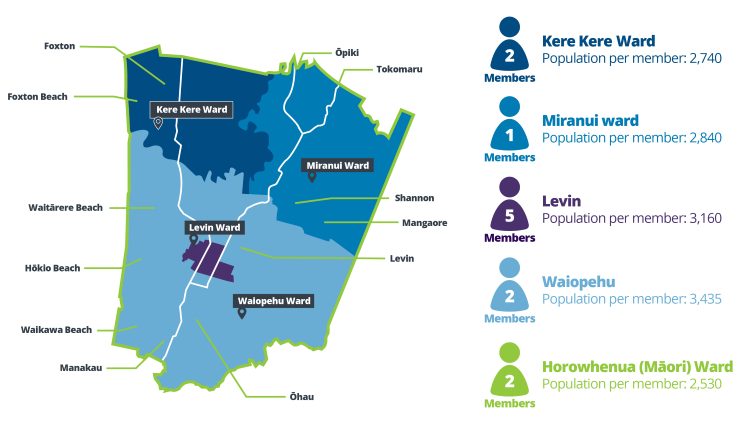Representation for the 2022 Local Government Election announced
Published on April 20, 2022

The Local Government Commission (LGC) has announced the representation arrangements for the upcoming local election of Horowhenua District Council on 8 October 2022.
Council’s decision in May 2021 to introduce a Māori Ward triggered the requirement for a representation review to take a fresh look at the number of councillors and wards, ward boundaries and their names, and whether there should be any community boards.
Councils must review their representation arrangements at least every six years to achieve fair and effective representation.
“As part of the representation review process, Council is required to adopt an Initial Proposal, consult with the community, hold hearings of submissions, and then adopt a Final Proposal,” Mayor Bernie explained.
Council received 226 submissions on its Initial Proposal. Considering all the submissions, changes were made, and the Final Proposal was adopted in October 2021. Appeals on Council’s Final Proposal were referred to the independent Local Government Commission according to the Local Electoral Act 2002.
The LGC determined that the following representation arrangements will apply:
Number of wards
There will be five wards, including four general wards and one Māori Ward.
Number of Councillors
The Council will comprise the mayor and 12 councillors elected as follows:
- 10 general ward councillors elected from four general wards and
- Two Māori ward councillors elected from the Māori Ward.
Community Board Representation
The Foxton Community Board had a name change and will be known as Te Awahou Foxton Community Board, comprising five elected members, and two members representing the Kere Kere General Ward appointed to the community board by the council.
Mayor Bernie welcomed the Commission’s determination, “I’m pleased with the determination of the LGC and the outcome of the representation review. I want to thank everyone who took the time and came to a drop-in session or made a submission. It is important that our communities are represented fairly and effectively to strengthen our local democracy.”

What has changed?
- The number of general wards has increased to five with the addition of the Māori Ward.
- The number of general councillors increased to 10, with the addition of two Māori Ward councillors, totalling 12 councillors.
- The boundaries of the Te Awahou Foxton Community Board were extended.
The next steps will be to get ready to vote. If you’ve moved since the last election, or you’re not registered as a voter, make sure that you enrol or update your details so that you don’t miss out.